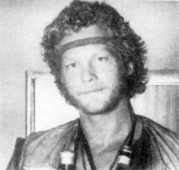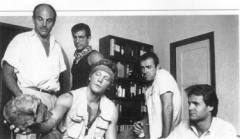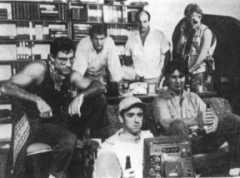 Rafael Lima has written a powerful report of an
incident gleaned from his one-year sojourn through
Central America as a freelance journalist during the
early '80s. Lima's unrelenting play EL SALVADOR, his
first full-length work, was originally produced by New
York's Circle Repertory Company in November, 1987. It is
receiving it's local premiere at the Gnu Theatre which
has become a notable waiver company in its brief three
years of operation. Lima's previous writing experience
includes working as a reporter for the Miami news, UPI
and Cable News Network. Based on his background and
experiences, Lima writes about what he knows first-hand
and the result in this riveting account places EL
SALVADOR well above most known dramatizations on the
subject of modern-day war correspondents.
Rafael Lima has written a powerful report of an
incident gleaned from his one-year sojourn through
Central America as a freelance journalist during the
early '80s. Lima's unrelenting play EL SALVADOR, his
first full-length work, was originally produced by New
York's Circle Repertory Company in November, 1987. It is
receiving it's local premiere at the Gnu Theatre which
has become a notable waiver company in its brief three
years of operation. Lima's previous writing experience
includes working as a reporter for the Miami news, UPI
and Cable News Network. Based on his background and
experiences, Lima writes about what he knows first-hand
and the result in this riveting account places EL
SALVADOR well above most known dramatizations on the
subject of modern-day war correspondents.The time is specific: late afternoon on January 20, 1981. President Reagan is about to be sworn into office, Iran has been holding American hostages for 443 days and in El Salvador a group of American journalists are covering that country's war. In the capital San Salvador, the journalists are based at the El Dorado Americana, in a hotel suite converted into a television news bureau. Not far from this city is the combat zone, where they witness the ravages of war.
Jeff Seymour has directed the play with a sure eye and a steady hand, capturing the humor that grows out of the devastation this handful of men encounters on a daily basis. Seymour has an uncanny ability of drawing the audience into each intimate moment while never losing the feeling of what is happening outside in the streets. He isolates specific scenes with perceptive insight, taking chances by allowing an actor to play an important scene upstage with his back to the audience while other actors silently react to this private moment. In one of the most hilarious dialogues between two actors, played in silhouette while the hotel experiences one of its many power failures, Seymour lets the men's body language speak as loudly as the words while viewers are left to imagine the facial reactions.
 Heading the team of reporters is bureau chief
John Fletcher. Fletcher, whose body is slowly succumbing
to the twin devils of alcoholism and fatigue, is
experiencing the crumbling of his 11 year marriage to
Felicia, whom he has abandoned in the States. His
assistant, Skeeter, has been in El Salvador only nine
weeks so his acerbic darts still spring from an urban
point of view. But his devotion to Fletcher is second
only to a wife's, as his boss sharply notes when Skee
hides his booze.
Heading the team of reporters is bureau chief
John Fletcher. Fletcher, whose body is slowly succumbing
to the twin devils of alcoholism and fatigue, is
experiencing the crumbling of his 11 year marriage to
Felicia, whom he has abandoned in the States. His
assistant, Skeeter, has been in El Salvador only nine
weeks so his acerbic darts still spring from an urban
point of view. But his devotion to Fletcher is second
only to a wife's, as his boss sharply notes when Skee
hides his booze.Then there are the news-getters. Hardened by years of being in the midst of war are photojournalist John Pinder, video cameraman Bill Fuller and crew technician Larry. All are veterans of atrocities, yet vulnerable when least expected.
Adding to the wildly fluctuating atmosphere, which leaps from lethargy and malaise to anxiety and hyperactivity with the sound of a helicopter on the summer breeze, is their oppressive realization that they, like the media they represent, are trafficking in death. This has turned Pinder into a callous brute, whose swinish behavior still can't shield him from the pain of the war. He is a gonzo photographer who comes off about as Neanderthal as the death-squad Salvadorans he rants about.
His opposite number, Fuller, has pushed his sensitivity to the foreground, hoping that it will propel him into leaving Central America and the horror. Fuller is given a compassionate rendering by Leo Rossi whose retelling of his witnessing a young boy's murder by gunfire is bone chilling.
Equally moving is David Ross Wolfe as the quiet though seething Larry who also seems to have reached his limit of endurance of watching these actual horrors through his camera lens that are later part of some footage sent to New York and transmitted on the evening television news.
 Their goal is to get the great shot, the hot
copy, to land the lead story on the evening news. But the
violent death of a 10 year-old child, captured by
Fuller's camera, coupled with an extremely upsetting
scene that focuses on Pinder and Rosita (Riad) -- the
only Salvadoran character in the play -- sets up an
intense examination of the nature of their role not only
as journalists but also as proxy participants in the real
conflict.
Their goal is to get the great shot, the hot
copy, to land the lead story on the evening news. But the
violent death of a 10 year-old child, captured by
Fuller's camera, coupled with an extremely upsetting
scene that focuses on Pinder and Rosita (Riad) -- the
only Salvadoran character in the play -- sets up an
intense examination of the nature of their role not only
as journalists but also as proxy participants in the real
conflict.In the brief, silent scene between Pinder and Rosita, the young prostitute Rosita reflects in her eyes the contempt and disregard the natives of this country obviously feel for American intruders.
They are all vivid, interesting characters. Each is a part of an overall jigsaw that, when assembled, gives us a picture of a day and night in the life of a TV news bureau. Lima's six tired and angry men are in a double pressure cooker: Not only are they in a war zone, but they're in a fast-lane occupation. One of the play's most riveting moments has to do with the feed of a news segment to the States.
Lima sees the humor, sometimes descending to that of ANIMAL HOUSE, and he sees the nihilism. His characters couldn't care less about the rightness or the wrongness of the war. They're here to get film on the war -- and they aren't above faking it.
Lima's colorful descriptions and stark dialogue are fully brought to life by the insightful guidance of a brilliant cast. This production demonstrates how even a play of tough fiber can be given texture of such high quality; an excellent rendering deserved by only the finest writing. Synopsized from reviews by Lee Melville for Drama-Logue, Dick Lochte for Los Angeles Magazine and Dan Sullivan for Los Angeles Times
"All of this, plus Lima's talent for dialogue that rings like tough poetry, makes for a dramatic, engrossing evening of theatre -- particularly when enacted by a cast as uniformly excellent as this." Dick Lochte
"James Morrison, by injecting a gut-wrenching force like a volcano on the verge of eruption, propels the play's hot energy as Pinder, a man who could explode with the flick of a trigger but holds back, with the cleverness and slick movements of a panther. Morrison... gives a performance so honestly realistic one quickly forgets he is acting." Lee Melville
Awards: EL SALVADOR received top honors at the 20th Annual Los Angeles Drama Critics Circle Awards. Winning the awards were James Morrison (leading performance), Rafael Lima (writing), Jeff Seymour (direction) and Gnu Theatre won for distinguished direction. James also won the Drama-Logue Award for his great portrayal of Pinder.
 James
Morrison (EL SALVADOR): "I thank Jeff
Seymour for seeing deep-seated sickness in me and then
helping me exploit it."
James
Morrison (EL SALVADOR): "I thank Jeff
Seymour for seeing deep-seated sickness in me and then
helping me exploit it."
